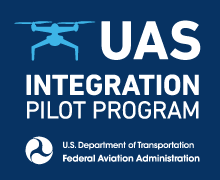State, local and tribal governments to test UAVs for FAA
 Ten state, local and tribal governments have been named to conduct flight tests as part of the Federal Aviation Administration’s (FAA’s) Unmanned Aircraft Systems (UAS) Integration Pilot Program.
Ten state, local and tribal governments have been named to conduct flight tests as part of the Federal Aviation Administration’s (FAA’s) Unmanned Aircraft Systems (UAS) Integration Pilot Program.
“We know our diverse new partners will help us address a broad range of complex drone integration challenges,” said FAA Acting Administrator Dan Elwell. “The fields that could see immediate opportunities from the program include commerce, photography, emergency management, public safety, precision agriculture and infrastructure inspections.”
The 10 programs are:
- Choctaw Nation of Oklahoma, Durant, Oklahoma
- City of San Diego, California
- Innovation and Entrepreneurship Investment Authority, Herndon, Virginia
- Kansas Department of Transportation
- Lee County Mosquito Control District
- Memphis-Shelby County Airport Authority
- North Carolina Department of Transportation
- North Dakota Department of Transportation
- City of Reno, Nevada
- University of Alaska-Fairbanks
Over the next two and a half years, the selectees will collect drone data involving night operations, flights over people and beyond the pilot’s line of sight, package delivery, detect-and-avoid technologies and the reliability and security of data links between pilot and aircraft.
The data collected from these operations will help the FAA:
- craft new enabling rules that allow more complex low-altitude operations,
- identify ways to balance local and national interests related to UAS integration,
- improve communications with local, state and tribal jurisdictions,
- address security and privacy risks, and
- accelerate the approval of operations that currently require special authorizations.
First announced in October 2017, the White House initiative partners the FAA with local, state and tribal governments, which then partner with private industry to safely explore the further integration of drone operations.
The program will help tackle the most significant challenges to integrating drones into the national airspace and will reduce risks to public safety and security.
Brian Wynne, president and CEO of the Association for Unmanned Vehicle Systems International (AUVSI), issued the following statement on the announcement of the participants selected for the FAA’s Unmanned Aircraft Systems (UAS) Integration Pilot Program:
“The participants selected for the FAA’s UAS Integration Pilot Program represent a commitment by governments at all levels to safely and efficiently integrate UAS into the national airspace. As more and more businesses and public institutions embrace UAS, it is more important than ever to have a process in which states, municipalities and tribal governments can provide input on federal policy without infringing on the U.S. government’s jurisdiction over the airspace.
“The data the participants will collect on UAS operations will help shape a national UAS policy framework, including for a UAS traffic management system and expanded UAS operations such as flying over people or beyond line of sight,” Wynne said. “We look forward to seeing the results of their work and the contributions these groups will make to keeping our skies safe.”
According to AUVSI, the potential economic benefit of drones in the nation’s air space, in less than a decade, is estimated at $82 billion and could create 100,000 jobs.
Drone maker DJI issued a statement saying it looks forward to the advances in drone regulatory procedures that will be enabled by the innovative proposals offered by the 10 state, local and tribal governments.
“Regulators and governments want to develop safe systems that encourage the beneficial uses of drones while addressing concerns about them, and today’s announcement is a major step forward in this effort,” said Brendan Schulman, DJI vice president of Policy & Legal Affairs. “By connecting state, local and tribal governments with industry partners and federal support, the Integration Pilot Program makes it easier to find ways for American businesses, governments and individuals to put drones to good uses all across the country.”
















Follow Us